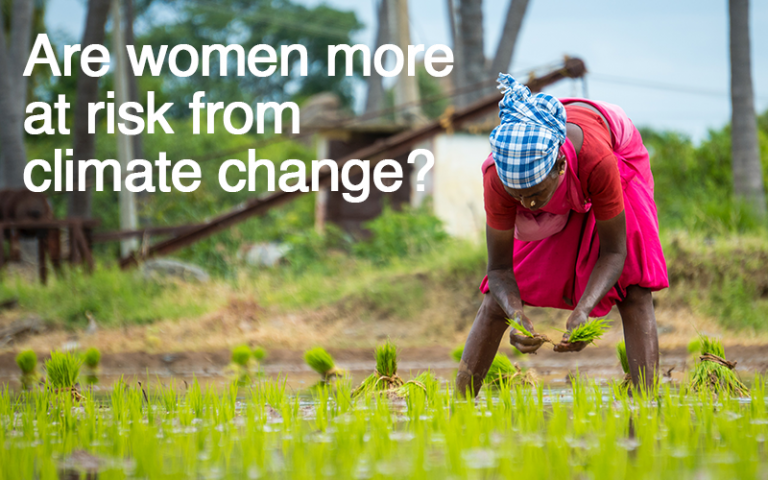Are women more at risk from climate change?
UCL experts are working to understand how and why climate change affects women and girls most acutely and how this trend can be reversed.

- What action can I take?
Join a community group working to tackle climate change in your area, and consider how gender interacts with your climate action: www.theclimatecoalition.org has a list of local organisations.
If you’re interested in learning more about intersectional approaches to climate change, listen to this podcast episode with Jacqui Patterson, Director of the NAACP Environmental and Climate Justice Programme, discussing how global warming disproportionately affects women of colour.
Pledge to take this action via the 'thumb up' icon - in the 'Pledge your action' box to the right (desktop) or below (mobile).
Inspire others by sharing this page and/or your pledge on social media. Use #UCLGenerationOne #COP26 #ClimateUCL @UCL @SustainableUCL.
While climate change has a worldwide influence, the effects of rising temperatures and disruption to weather systems will not be felt equally. It’s a sad fact that people who are already the most vulnerable and marginalised will feel the effects more. And in many societies, such groups are more likely to include women than men.

“Women face a double burden due to the lack of infrastructure and climate change,” says Dr. Priti Parikh an Associate Professor in the Bartlett School of Sustainable Construction at UCL.
What makes women worse off?
"In many settings women are responsible for finding water and fuel and for cooking meals. They already face a struggle to do that just due to poor infrastructure. Now, if you add climate change to this pot, it means that these kinds of struggles get further enhanced.”
Parikh was one of a trio of experts who recently addressed this topic at a live-streamed UCL lunchtime discussion held in December last year. The event was held as the issue of gender and climate change is being increasingly recognised as globally important. The 2015 Paris Agreement on climate change, for example, makes specific provision for the empowerment of women because they are disproportionately affected.
“Women and girls are already more likely to face hardships and climate change simply adds another layer or dimension to it,” Parikh says.
Making a bad situation worse
According to Jordana Ramalho, a Lecturer in Development Planning for Diversity at UCL, and another speaker at the event, climate change affects women and girls most acutely because it exacerbates the existing outcomes of entrenched gender inequality.

“The main dimension that I would highlight is around gender distributions of labour and the ways in which hidden labours play out in pre-existing vulnerabilities or inequalities, which become exacerbated during times of crisis,”
Across the world, women on average have less socioeconomic power than men and are more likely to experience poverty. This makes it more difficult for them to recover from disasters that disrupt infrastructure, jobs and housing.
For example, after Hurricane Katrina in 2005, African American women were among the worst affected by the subsequent flooding. And an Oxfam report found that among the survivors of the 2004 Boxing Day tsunami in Sri Lanka, Indonesia and India, men outnumbered women by almost three to one. Men were more likely to be able to swim, and women lost evacuation time trying to look after children and other relatives.
Women’s roles in many communities as primary caregivers and providers of food and fuel can also make them more vulnerable to flooding and drought, Ramalho points out.
Based on ethnographic research she has carried out in disaster-prone informal settlements in Metro Cebu, the Philippines, Ramalho argues that discussions of the impact of climate change must focus on everyday risks as well as the more sensational headline-grabbing impacts. Women and girls who spend more time in the home, for example, are exposed more to unsafe water and polluted air, and the health impacts of both are made more severe as temperatures rise.
“To connect that with climate change, you’ve got urban heat traps, which tend to be in these high density, urban settlements, and compound the effects on people that are involved in labour connected with those types of environmental issues,” she says.
There are other impacts too. Households affected by climate-related disasters such as drought can react by taking girls out of school, to help work or look after families. Parents who struggle to feed their children can feel compelled to give their daughters away for early marriage. When the worst effects of climate change make land-based work impossible, women often have less opportunities than men to find other forms of work. And when families are forced from rural to urban areas, women who lose access to their local support network are more at risk of domestic violence.
Building resilience

“We have a number of initiatives, often led by women, that address environmental degradation and climate change, through a gender equality perspective,”
says Virginie Le Masson, co-director of the UCL Centre for Gender and Disaster, who also spoke at the December event.
Projects include efforts to reduce waste and promote recycling in the Dominican Republic and setting up a solar powered charging station for an electric trike scheme to promote women-based transport in Zimbabwe.
Le Masson adds that governments must put more funds into the care economy. “That’s the healthcare sector and the social care sector. These sectors are systematically under-resourced and yet are so fundamental to help build resilience to different risks,” she says.
The public can help too, she says, by building awareness of how the effects of climate change will be unevenly distributed.
“Be curious and be aware that while everyone is and will be affected by climate change, not everyone will be able to deal with climate change in the same way,” she says. “It’s important to understand why, and to see if as citizens we can help one another.”
 Close
Close

